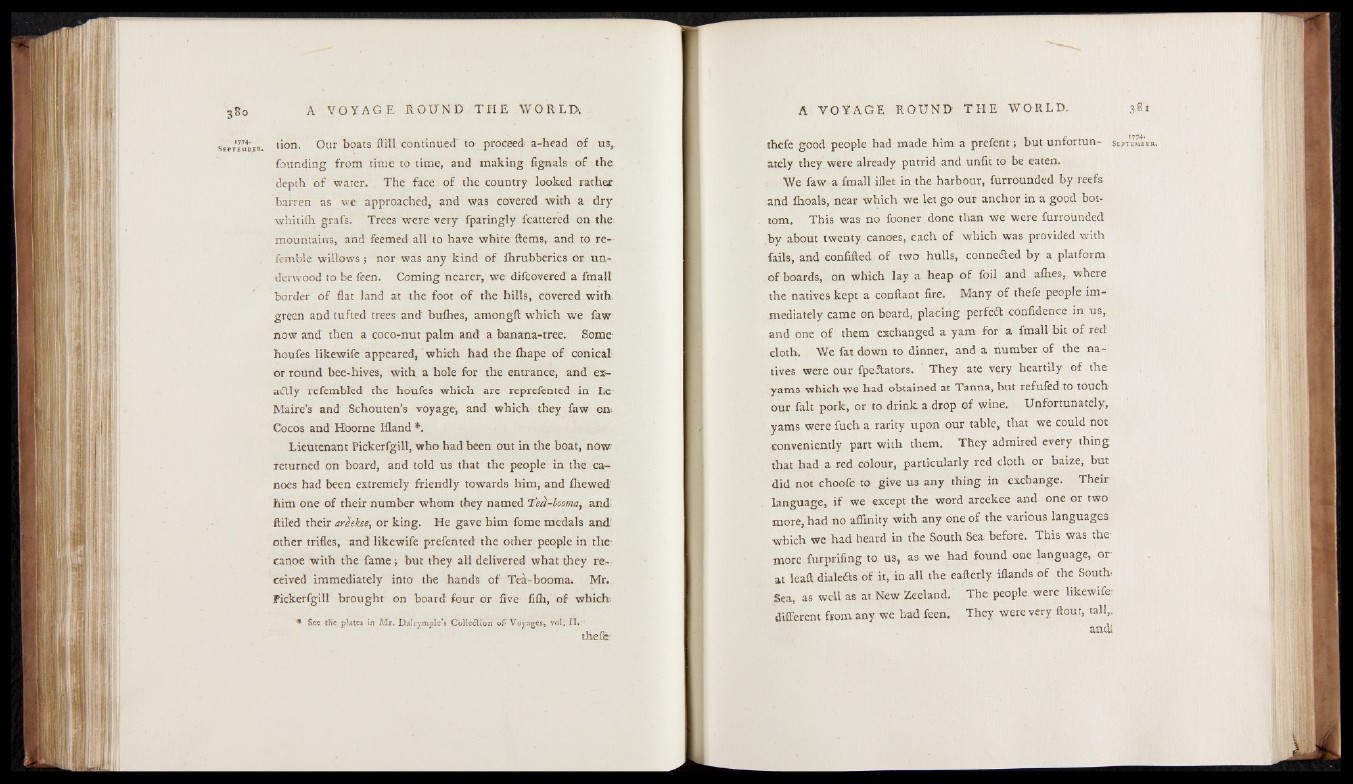
September, tion. Our boats flill continued to proceed a-head of us,.
founding from time to time, and making fignals of the
depth of water. The face of the country looked rather
barren as we approached, and was covered with a dry
whitifh grafs. Trees were very fparingly fcattered on the
mountains, and feemed all to have white Items, and to referable
willows ; nor was any kind of fhrubberies or underwood
to be feen. Coming nearer, we difcovered a final!
border of flat land at the foot o f the hills, covered with,
green and. tufted trees and bufhes, amongft which we faw
now and then a coco-nut palm and a banana-tree; Some-
houfes likewife appeared, which had the fhape of conical
or round bee-hives, with, a hole for the entrance; and exactly
refembled the hou fes which are reprefen ted in Le-
Maire’s and Schouten’s voyage, and which they faw on-.
Cocos and Hoorne Ifland *.
Lieutenant Pickerfgill, who had been out in the boat, now-
returned on board, and told us that the people in the canoes
had been extremely friendly towards him, and fhewed'
him one of their number whom they named iea-booma, and;
ftiled their areekee, or king. He gave him fome medals and'
other trifles, and likewife prefented the other people in the-
canoe with the fame ; but they all delivered what they received
immediately into the hands of Tea-booma, Mr.
Pickerfgill brought on board" four or five fifh, of which;
* See tlie. plates in Mr. D.alrymple’s Col left ion of- Voyages, vol. Hi
thefc-
3-8 r
thefe good people had made him a prefent; but unfortun- September.
ately they were already putrid and unfit to be eaten.
We faw a fmall iflet in the harbour, furrounded by reefs
and fhoals, near which we let go our anchor in a good bottom.
This was no fooner done than we were furrounded
by about twenty canoes, each of which was provided with
fails, and confifted of two hulls, connected by a platform
of boards, on which lay a heap of foil and afhes, where
the natives kept a conftant fire. Many of thefe people immediately
came on board, placing perfect confidence in us,
and one of them exchanged a yam for a fmall bit of red
cloth. We fat down to dinner, and a number of the natives
were our fpeftators. They ate very heartily of the
yams which we had obtained at Tanna, but refufed to touch
our fait pork, or to drink a drop of wine. Unfortunately,
yams were fuch a rarity upon our table, that we could not
conveniently part with them. They admired every thing
that had a red colour, particularly red cloth or baize, but
did not choofe to give us any thing in exchange. Their
language, if we except the word areekee and one or two
more, had no affinity with any one of the various languages
which we had heard in the South Sea before. This was the
more furprifing to us, as we had found one language, or
at leaft dialedts of it, in all the eafterly iflands of the South.
Sea, as well as at New Zeeland. The people were likewife:
different from any we had feen. They were very flout, tall,,
and!